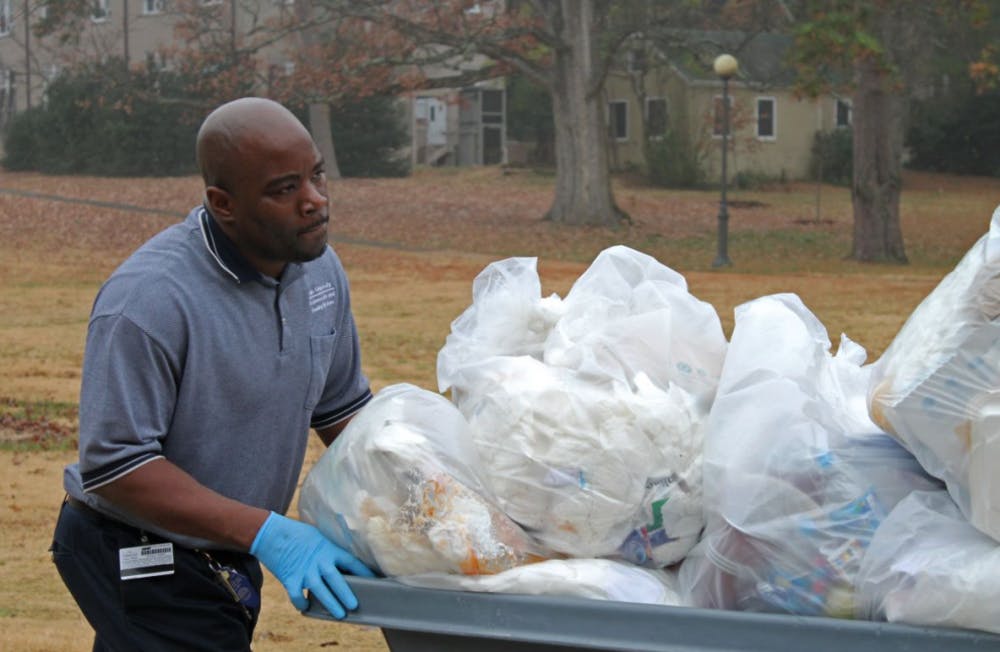Reactions to the University's minimum wage increase have been mixed.
The University announced Wednesday that it will increase its minimum wage to $13 an hour beginning Jan. 1, 2017—a one-dollar increase from the previous $12 an hour—for all regular staff and full-time employees of contractors. The minimum wage for employees of the city of Durham is currently $12.53 an hour, to be $15 an hour in 2018.
The adjustment follows a series of protests in the Spring led by students advocating for increased workers' rights. Vice President for Administration Kyle Cavanaugh, in a Duke Today release, said the change was part of an annual review.
One of the demands issued by Duke Students and Workers in Solidarity included a gradual increase of the minimum wage to $15 an hour by July 2019. The group released a statement on Facebook Wednesday saying they are encouraged by the increase, but that the administration must do more to support its workers.
“In order for the administration to truly address Duke’s plantation politics, we need far more than incremental wage increases and token ‘task forces’ that do not allow for worker voices,” the statement reads.
DSWS took issue with an assertion made by Cavanaugh that the increase, combined with Durham’s low cost of living, “reflects Duke’s commitment to being a leading employer in the area of total compensation."
“While Durham may have a ‘low cost of living’ for Kyle Cavanaugh and other top administrators, those without six-figure salaries find it more difficult to make ends meet—especially as rising costs and rampant gentrification continue to displace longtime residents and communities of color,'” the DSWS statement said.
Value of a minimum wage
Robert Korstad, professor of public policy and history, said the minimum wage required for employees to earn a living wage in Durham is higher than $13 an hour. He noted that Durham’s increasing rate of gentrification is a problem that many blue-collar workers face when trying to make ends meet.
“There’s a pretty good way to go to having wages that actually help keep people really out of poverty, particularly if they are adults and have children,” he said.
Korstad also took issue with Cavanaugh’s statement, explaining that finding affordable housing is difficult for many Durham residents. Many residents pay more than the recommended 30 percent of their salaries to housing—"and it’s usually not very good housing,” he said.
If Duke is truly committed to allowing its workers to have adequate places to live, there needs to be more of a push for affordable housing in the Durham area, Korstad added. Duke has worked to create affordable housing in the Southside neighborhood, but with fragmented success.
DSWS also expressed concern that the increase does not impact part-time or seasonal workers, the vast majority of which are “people of color, who remain not only underpaid, but also subject to hostile, racist work environments.” The group asserted that these employees did not previously benefit from the previous $12 an hour minimum “that the University so proudly advertised as a sign of progress."
On the other hand, economics professor Peter Arcidiacono expressed doubts that increasing the minimum wage will actually benefit workers in the first place.
“If you have to pay more for labor, you’re going to look for ways to avoid using labor,” he said.
Arcidiacono explained that it is important to consider how past increases in minimum wage have affected the labor market and if these changes have increased the diversity of the workforce.
The raise in minimum wage could also increase the number of applicants for Duke jobs, Arcidiacono said, resulting in less hiring of those who need jobs the most.
What's next
Cavanaugh wrote in an email that the minimum wage increase occurred after Duke Human Resources reviewed the total compensation for Duke’s job classifications, including direct compensation and benefits such as paid time off, holidays, retirement and health care.
“We will continue to review and assess those ranges each year,” he wrote.
Korstad said that he thinks DSWS will take encouragement from the raise increase, and said peaceful protests often bring attention to issues and put pressure on people who make policies.
The increase might “put things off for a while,” Arcidiacono noted, adding that minimum wage is always increasing and the issue may come up again.
Get The Chronicle straight to your inbox
Signup for our weekly newsletter. Cancel at any time.

